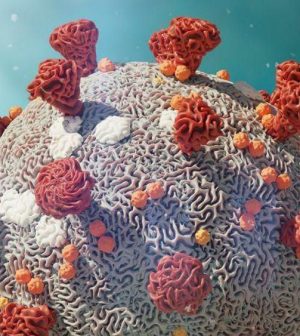- 10 Strategies to Overcome Insomnia
- Could Artificial Sweeteners Be Aging the Brain Faster?
- Techniques for Soothing Your Nervous System
- Does the Water in Your House Smell Funny? Here’s Why
- Can a Daily Dose of Apple Cider Vinegar Actually Aid Weight Loss?
- 6 Health Beverages That Can Actually Spike Your Blood Sugar
- Treatment Options for Social Anxiety Disorder
- Understanding the Connection Between Anxiety and Depression
- How Daily Prunes Can Influence Cholesterol and Inflammation
- When to Take B12 for Better Absorption and Energy
First U.S. Omicron Case Reported in California

The first confirmed U.S. case of the Omicron variant has been reported in California, the U.S. Centers for Disease Control and Prevention announced Wednesday.
The patient was a traveler, apparently from the San Francisco area, who returned from South Africa on Nov. 22, the CDC said in a statement.
The person, who was fully vaccinated, developed mild COVID symptoms that are improving, the CDC said.
Genome sequencing at the University of California, San Francisco, identified the person’s infection as being caused by the Omicron variant, and the CDC has confirmed it.
“The individual is self-quarantining and all close contacts have been contacted, and all close contacts thus far have tested negative,” Dr. Anthony Fauci, President Biden’s chief medical adviser, said during a media briefing Wednesday afternoon.
“We knew that it was just a matter of time before the first case of Omicron would be detected in the United States,” Fauci told reporters.
As a result, the California Department of Public Health (CDPH) announced that the state is increasing COVID testing at its airports for arrivals from countries identified by the CDC.
“We recognize that everyone is exhausted, and the news of a new variant can be overwhelming,” the CDPH/San Francisco Health Department said in a joint statement. “It is important that we collectively focus on the things we know prevent the spread of COVID-19, and its variants. Individuals should (1) get vaccinated and boosted; (2) wear your mask in indoor settings; (3) get tested if you have symptoms; and (4) stay home if you are sick.”
Omicron has caused concern among medical experts due to a “large number of mutations, around 50, much larger than previous variants,” including some “anticipated to impact transmissibility and antibody binding,” Fauci said Tuesday.
It’s too soon to tell how transmissible the new variant is and whether it can evade existing vaccines, Fauci said, but he noted that more than 30 mutations are in the spike protein of the virus. He referred to the protein as the “business end of the virus,” because that’s where the coronavirus attaches onto and infects human cells.
However, officials are confident that the antibody levels produced by boosted vaccination will be enough to provide protection against hospitalization and death with the Omicron variant, Fauci said.
News from Israel buttressed that notion: There are “indications” that people who received a COVID booster are “protected” against the Omicron variant, Israeli Health Minister Nitzan Horowitz said Tuesday.
“In the coming days we will have more accurate information about the efficacy of the vaccine against Omicron, but there is already room for optimism, and there are initial indications that those who are vaccinated with a vaccine still valid or with a booster will also be protected from this variant,” Horowitz said during a news conference, CNN reported. Boosters have been available in Israel to anyone over age 16 since late August, five months after their second dose of the vaccine.
“Although partial immune escape may occur, vaccines, and particularly boosters, give a level of antibody that even with variants like Delta give you a degree of cross-protection, particularly against severe disease,” Fauci said Tuesday. “There’s every reason to believe as we talk about boosters, when you get a level high enough that you are going to get at least some degree of cross-protection, particularly against severe disease.”
One expert said the emergence of the first U.S. case of the Omicron variant doesn’t change what needs to be done in response.
“There was no question in my mind that there would be an omicron case in the U.S. and it doesn’t change much in terms of the steps necessary,” said Dr. Amesh Adalja, a senior scholar at Johns Hopkins Center for Health Security in Baltimore. “We still have to get answers to fundamental questions about this variant, we still need to vaccinate a lot more people [because the vaccine will prevent serious infections with this variant], and we need to scale up diagnostic testing. We must also rescind the charade of the travel ban.”
More information
Visit the U.S. Centers of Disease Control and Prevention for more on COVID variants.
Source: HealthDay
Copyright © 2026 HealthDay. All rights reserved.










